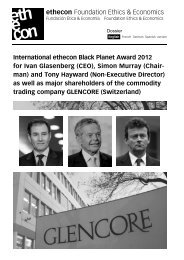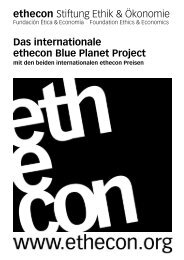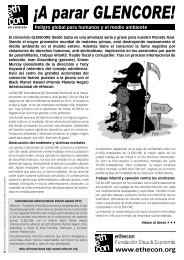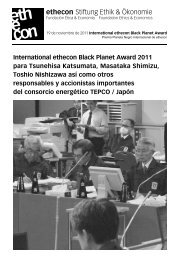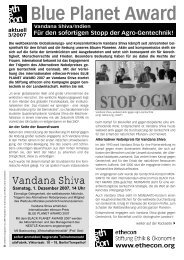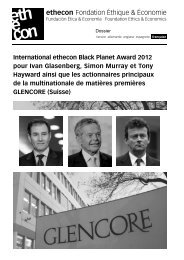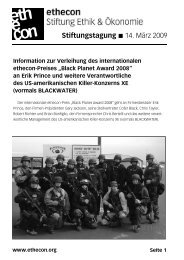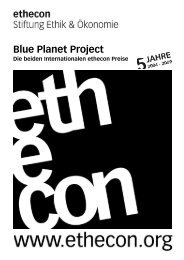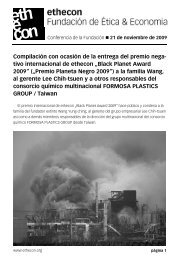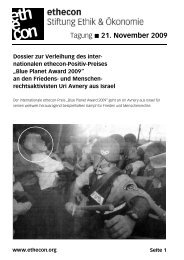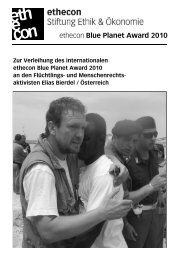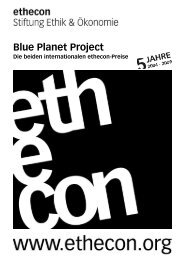Dossier Angela Davis / Blue Planet 2011 - Ethecon
Dossier Angela Davis / Blue Planet 2011 - Ethecon
Dossier Angela Davis / Blue Planet 2011 - Ethecon
Create successful ePaper yourself
Turn your PDF publications into a flip-book with our unique Google optimized e-Paper software.
ethecon Foundation Ethics & Economics<br />
Fundación Ética & Economía Stiftung Ethik & Ökonomie<br />
International ethecon <strong>Blue</strong> <strong>Planet</strong> Award <strong>2011</strong><br />
for the civil and human rights activist<br />
<strong>Angela</strong> <strong>Davis</strong> / USA<br />
In September 1963 the Ku-Klux-Klan of her home town Birmingham carried out a bomb attack on the<br />
16h Street Baptist Church, a church well-known to <strong>Angela</strong>. Four young Afro-Americans died. Two of<br />
them <strong>Angela</strong> knew personally. This act upset her deeply and strengthened her resolve to defy racism<br />
and the political system behind it.<br />
After returning home from France and consulting with the well-known West-German Professor Herbert<br />
Marcuse17 , who taught at Brandeis and later called <strong>Davis</strong> the most gifted student he ever had, <strong>Angela</strong><br />
began studying philosophy. Encouraged by Marcuse, she went to Frankfurt/Main in 1965, where<br />
she studied philosophy and sociology at the University of Frankfurt. Among her teachers were Theodor<br />
Adorno, Max Horkheimer, Jürgen Habermas and Oskar Negt18 . During her time in Frankfurt she joined<br />
an anti-Vietnam War movement and took part in the activities of the SDS, Socialist German Student Union<br />
(Sozialistischer Deutscher Studentenbund19 ), which played an important roll in the German Student<br />
Movement in the 1960s. However, because at home the conflict between the Afro-American civil rights<br />
activists and the repressive government authorities was rapidly escalating, <strong>Angela</strong> <strong>Davis</strong> returned to the<br />
US in the summer of 1967.<br />
She enrolled in the University of California at San Diego where she joined the Student Nonviolent Coordinating<br />
Committee (SNCC) 20 . She also joined the Black Panther Party (BPP) 21 , a civil rights and selfprotection<br />
movement founded in 1966. Due to the fact that a large number of Afro-Americans had become<br />
victims of acts of violence and armed attacks often ending in death, the BPP armed itself within<br />
the limits of the US gun laws and organized the protection of Afro-American neighborhoods and leaders.<br />
As <strong>Angela</strong> did not agree with the chauvinism of the male-dominated BPP and as she wanted to realize<br />
political ideas that went beyond racial issues, she became a member of the Che Lumumba Club, an<br />
Afro-American youth section of the Communist Party USA (CPUSA) in Los Angeles.<br />
17 Herbert Marcuse was an important German-American philosopher, political scientist and sociologist. His philosophy shows the strong influenced<br />
of Karl Marx, although he viewed Marx more critically in later years. He emigrated to the USA via Switzerland and Paris after the Nazi<br />
takeover in 1933. In 1954 he became a professor at Brandeis University in Waltham, Massachusetts, in 1964 at the University of California in<br />
San Diego. In 1965 he accepted a visiting professorship at the Free University (Freie Uniersität) in Berlin. His writings belong to the most important<br />
works of Critical Theory and in the 1960s they served as standard works in the German Student Movement.<br />
18 Theodor Adorno, Max Horkheimer, Jürgen Habermas and Oskar Negt taught at the Institute for Social Research in Frankfurt and were representatives<br />
of the „Frankfurt School“, a group of philosophers who further developed the theories of Hegel, Marx and Freud. They were also<br />
representatives of the „Critical Theory“, which was first established in Frankfurt as a separate line of thought. The core of this theory is the<br />
critical discussion of the social and historical conditions of theory development. The criticism of societal interrelations is thereby connected<br />
with the claim to permeate and clarify conceptually the totality of societal conditions and the necessity for their change.<br />
19<br />
Cf. http://de.wikipedia.org/wiki/Sozialistischer_Deutscher_Studentenbund.<br />
20 The SNCC was founded in 1960 at a meeting of Afro-American and white students initiated by Martin Luther King. It was one of the most<br />
important organizations of the civil rights movement.<br />
21 Cf. http://en.wikipedia.org/wiki/Black_Panther_Party.<br />
www.ethecon.org / Facebook / Twitter<br />
Page 11




